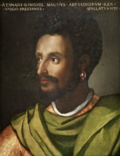Amhara people
Amhara People
The Amhara are an ethnic group traditionally inhabiting the central highland plateau of Ethiopia. They are one of the largest ethnic groups in Ethiopia, constituting about 27% of the country's population. The Amhara people have played a significant role in the history of Ethiopia, particularly in the establishment and maintenance of the Ethiopian Empire.
Language
The Amhara people speak Amharic, which is a member of the Semitic branch of the Afroasiatic language family. Amharic is the official working language of Ethiopia and is used in government, media, and education. It is written in the Ge'ez script, which is also used for several other languages in Ethiopia.
Religion
The majority of Amhara people adhere to Ethiopian Orthodox Christianity, which has been a central part of their cultural identity for centuries. The Ethiopian Orthodox Church is one of the oldest Christian denominations in the world, and it has a rich tradition of liturgy, music, and art. A minority of Amhara people practice Islam, and there are also small communities of Protestants and other religious groups.
History
The Amhara have been influential in Ethiopian history, particularly during the reign of the Solomonic dynasty, which claimed descent from the biblical King Solomon and the Queen of Sheba. The Amhara were instrumental in the expansion and consolidation of the Ethiopian Empire, and they have traditionally held positions of power in the Ethiopian government.
During the 19th and 20th centuries, the Amhara were central to the modernization efforts of Ethiopia, including the establishment of a centralized state and the introduction of modern education and infrastructure. The Amhara have also been involved in various conflicts and political movements within Ethiopia, including the struggle against Italian occupation during the Second Italo-Ethiopian War.
Culture
Amhara culture is characterized by its rich traditions in music, dance, and literature. Traditional Amhara music often features the use of the krar, a type of lyre, and the masenqo, a single-stringed fiddle. Dance is an important part of Amhara celebrations and religious ceremonies.
The Amhara have a strong tradition of oral literature, including proverbs, folktales, and epic poetry. Written literature in Amharic has also flourished, with notable works in both religious and secular genres.
Social Structure
Traditional Amhara society is organized around a hierarchical system, with a strong emphasis on family and community. The extended family is the basic social unit, and kinship ties are important in social and economic interactions. The Amhara have a patrilineal system of inheritance, and land ownership has historically been a key aspect of social status.
Related Pages
Transform your life with W8MD's budget GLP-1 injections from $125.
W8MD offers a medical weight loss program to lose weight in Philadelphia. Our physician-supervised medical weight loss provides:
- Most insurances accepted or discounted self-pay rates. We will obtain insurance prior authorizations if needed.
- Generic GLP1 weight loss injections from $125 for the starting dose.
- Also offer prescription weight loss medications including Phentermine, Qsymia, Diethylpropion, Contrave etc.
NYC weight loss doctor appointments
Start your NYC weight loss journey today at our NYC medical weight loss and Philadelphia medical weight loss clinics.
- Call 718-946-5500 to lose weight in NYC or for medical weight loss in Philadelphia 215-676-2334.
- Tags:NYC medical weight loss, Philadelphia lose weight Zepbound NYC, Budget GLP1 weight loss injections, Wegovy Philadelphia, Wegovy NYC, Philadelphia medical weight loss, Brookly weight loss and Wegovy NYC
|
WikiMD's Wellness Encyclopedia |
| Let Food Be Thy Medicine Medicine Thy Food - Hippocrates |
Medical Disclaimer: WikiMD is not a substitute for professional medical advice. The information on WikiMD is provided as an information resource only, may be incorrect, outdated or misleading, and is not to be used or relied on for any diagnostic or treatment purposes. Please consult your health care provider before making any healthcare decisions or for guidance about a specific medical condition. WikiMD expressly disclaims responsibility, and shall have no liability, for any damages, loss, injury, or liability whatsoever suffered as a result of your reliance on the information contained in this site. By visiting this site you agree to the foregoing terms and conditions, which may from time to time be changed or supplemented by WikiMD. If you do not agree to the foregoing terms and conditions, you should not enter or use this site. See full disclaimer.
Credits:Most images are courtesy of Wikimedia commons, and templates, categories Wikipedia, licensed under CC BY SA or similar.
Contributors: Prab R. Tumpati, MD












